Politics
About Andrew Cusack
 Writer, web designer, etc.; born in New York; educated in Argentina, Scotland, and South Africa; now based in London.
Writer, web designer, etc.; born in New York; educated in Argentina, Scotland, and South Africa; now based in London. read more
News
Blogs
Reviews & Periodicals
Arts & Design
World
France
Mitteleuropa
Knickerbockers
Argentina
The Levant
Africa
Cape of Good Hope
Netherlands
Scandinavia
Québec
India
Muscovy
Germany
Academica
The Iconography of Party
Taking into account the important aesthetical nature of politics, it might be worthwhile taking a sweep round the political parties to see what their emblems, logos, and symbols look like. (more…)
In Defence of Orbánisation
The silent majority of Hungarians have at last found a voice in the Fidesz party – and the European Commission don’t like what they are hearing.
by ALEXANDER SHAW in Brussels
In under two years, Viktor Orbán’s regime has reduced the Hungarian budget deficit, reduced personal income taxes, returned the GDP to growth and proclaimed sovereign primacy over supranational diktats. Adopted at the beginning of this year, Fidesz’s new national constitution finally overthrows the Communist era law of 1949. Hungary is the last former East Bloc nation to have achieved this. It is hardly surprising, therefore, that 300,000 Hungarians marched to support their government when the reforms came under fire from the EU in January. It was the biggest demonstration in Hungary since the regime change. The message was clear: Fidesz’s democratic mandate is as mighty as ever and Hungarians want sovereignty. (more…)
The Hon. Lady Goulding
Grande dame of charity and sometime Fianna Fáil senator who provided a ‘harbour of hope’ for the disabled & represented Ireland in squash
IF, LIKE ME, YOUR Venn diagram shows a massive overlap for the circles representing politics, history, aesthetics, and design, then the Irish Election Literature website is a dangerous place where you can waste many minutes of your day. Not long ago, I stumbled across their collection of electoral bits related to Valerie, the Hon. Lady Goulding — at least I think that’s the proper style, these realms are arcane and murky. She was most often, but incorrectly referred to as Lady Valerie Goulding, the fate of many wives of baronets I’m afraid.
She was born Valerie Hamilton Monckton in 1918 at Ightham Mote (pronounced “item moat”, obv.), the house noted for its Grade I listed dog kennel. Her father, Sir Walter Monckton (later 1st Viscount Monckton of Brenchley) was a trusted friend of Edward VIII, and the teenage Valerie was employed as a messenger shuttling letters between the King’s refuge at Fort Belvedere and Stanley Baldwin in Downing Street. Visiting Fort Belvedere in 1993, Lady Goulding recalled the last lunch she had attended there in December 1936:
She [Mrs Simpson] was leaving that afternoon for Cannes, and everyone was talking about nothing so as to avoid what was on everyone’s mind. But one really nice thing happened: there were four bottles of beer next to my place. The King had remembered that when we were rounding up the ponies on Dartmoor the previous year I had a beer in the pub, and that he had remarked that I was very young to be drinking. It was very touching.
In 1939 she attended the Fairyhouse races and met Sir Basil Goulding at a dinner party. Goulding had significant business interests in Ireland and became known for once entering a bank board meeting on rollerskates. On her second visit to Ireland, they became engaged, and married quickly as the threat of war loomed on the horizon. Sir Basil served in the RAF, rising to the rank of Wing Commander, while Lady Goulding opted for the First Aid Nursing Yeomanry before switching to the Auxiliary Territorial Service. After the war, the Gouldings moved to Dargle Cottage in Enniskerry, Co. Wicklow. (more…)
‘Called Before the Tribunal of Reason’
Some Essays of Pierre Manent in English
I’VE BEEN ON a Pierre Manent kick recently, whom a friend in Paris describes as “a giant, grossly under-rated in the Anglophone world and treated with considerable disdain even in France on account of not being a prisoner of ephemeral conventional wisdom. ”
Given the current penitential season, it might be worth reading Manent’s “Reason and Faith: A Lenten Reflection”. This paragraph was one among the many that struck me with its accuracy:
Christian faith, for its part, accepts being called to appear before the tribunal of reason. It is distinctive of the Christian God to leave man to his own counsel, and to put the fulfilment of the plan of salvation as it were at the mercy of human freedom. This is why Christianity is not a law, but a faith. This is why the Bible is not a teaching dictated by heaven like the Koran. It is a chronicle, full of detours, of an often-broken and ever-renewed covenant between divine goodness and human freedom.
Much of Manent’s pondering is on the realm of political philosophy. His 1999 essay “The Return of Political Philosophy” explores the death of political philosophy over the course of the twentieth century, while his lecture “Current Problems of European Democracy” examines the depoliticisation of European societies. “The Greatness and Misery of Liberalism” is also worth a read.
Hungary Reasserts Sovereignty
Deputy PM Navracsics asserts to shocked Commissioner that Council of Europe “cannot impose anything which runs counter to our constitution”
Hungary yesterday declared its sovereign primacy over the EU. In a heated dialogue between Tibor Navracsics and Commissioner Neelie Kroes, the Hungarian deputy PM staidly remarked that his country would not impose legislation which was contrary to its new constitution. The packed committee room gasped in horrified awe. Kroes was visibly furious as she stormed out, expressing her usual ‘grave concerns’ about Hungary.
Kroes had obviously been banking on Navracsics’s compliance with the Council of Europe’s recommendations, EU member states being bound to comply with the Council of Europe’s Fundamental Charter of Human Rights under the Treaty of Lisbon. The Hungarian government is under scrutiny from the EU for the possible breach of various articles of the Charter. When asked directly where his priorities lay in implementing recommendations, however, the founding member of the ruling Fidesz party stated “I’m a Hungarian member of parliament and I have sworn allegiance to the constitution of Hungary.” (more…)
Adding to Ulster’s Party Panoply
Tim Montgomerie’s ConservativeHome website reports that the Conservative & Unionist Party is setting up its own party in Northern Ireland, following the failure of its collaboration with the Ulster Unionist Party. At the last election, the Tories ran a joint ticket with the UUP under the name ‘Ulster Conservatives and Unionists – New Force’ which fell rather flat.
In the years before the party system was as solidly formalised as it now is, Unionist MPs took the Conservative whip at Westminster but today the SDLP is the only Northern Irish party which takes the whip of a British party (in its case, Labour). Gradually official Unionists found themselves increasingly challenged by upstarts, which evolved into the formal division between the Ulster Unionist Party (moderate liberal-conservative unionists) and Paisley’s Democratic Unionist Party (hardcore conservative unionists).
The decision to start a separate Conservative & Unionist party for Ulster is a curious one, as it can only further split the Unionist vote, already divided between the dominant DUP and the fading UUP. This is at least simpler than in the 1990s and 2000s, when the vote split between these two and smaller Unionist groupings like the UK Unionists, the Progressive Unionist Party, the Ulster Democratic Party, and the Northern Ireland Unionist Party.
My favourite Unionist Party, however, was that which dominated the political scene in the Punjab from the First World War until Partition. It was primarily the instrument of the Muslim, Hindu, and Sikh gentry of the province, and counted three holders of knighthoods — Sardar Sir Sikander Hayat Khan, Sir Fazli Husain, and Rao Bahadur Sir Chhotu Ram — among its founders. Alas, with the increasing enmity between the Hindu and Muslim populations of India, its existence became unsustainable, and even the Punjab Province itself was split between Pakistan and India at independence. Sic transit gloria mundi!
Senator Eugene McCarthy: A Kirkian Anecdote
Russell Kirk, the great St Andrean and American man of letters, relates this anecdote in his article “Will American Caesars Arise?” (Modern Age, Summer 1989):
The most interestingly complex of all recent aspirants to the presidency, [Senator Eugene] McCarthy obdurately called himself a liberal during years when that appellation was sinking swiftly in popular favour – although he abjured all forms of liberalism earlier than Franklin Roosevelt’s. (During the past few years, as he now remarks, he has employed the word ‘‘liberal’’ as an adjective merely.) In his political theories, actually, McCarthy has been a conservative: He declared long ago that Edmund Burke was his political mentor, and no one has more warmly praised Tocqueville. He has read seriously and written intelligently. In the White House – per impossibile – he might have turned the most imaginatively conservative of Presidents.
Or perhaps not. Once upon a time I had an assistant who was a graphoanalyst, an expert on handwriting. Having examined a specimen of Senator McCarthy’s handwriting, my assistant pronounced him rebellious, a hard master, and desirous of power. A touch of Caesar even in Caesar’s adversary? However that may be, McCarthy’s only considerable assertion of power was his unseating of President Johnson by running a good second in the New Hampshire primary of 1968.
A congenital no-sayer, Eugene McCarthy never ran with the hounds. He was candid and witty always. He and I first met as debaters before a large audience, in Boston. After this exchange, sponsored by the Paulist Fathers, a reception was held for us. Up to Senator McCarthy came a zealous young Paulist, inquiring, “Senator McCarthy, don’t you think that Jack Kennedy is the finest president this nation ever has had?” (This occurred during the first year of the Kennedy administration.)
“No,” said McCarthy, unsmiling.
Although taken aback, the Paulist returned to the charge: “But surely you agree, Senator, that President Kennedy has given this nation a new hope, a new vigor, a sense of moving forward toward great things?”
“No,” said Eugene McCarthy.
The Paulist persisted: “But of course you’ll agree with me when I say, Senator, that the Kennedy family have brought to our life a culture, a refinement, a meaningfulness, that we have not known before.”
“No,” said Eugene McCarthy.
“But – but Senator McCarthy, surely Jack Kennedy is a very nice man personally?”
Eugene McCarthy turned his back upon the Paulist and slowly walked away. He knew how to say no, he was not ensnared by cliché and slogan, and he had a poet’s attachment to truth.
Les fondements de notre civilisation occidentale
« Les fondements de notre civilisation occidentale sont chrétiens ; le respect du christianisme est une condition sine qua non d’une droite qui veut conserver non seulement la prospérité économique, mais ce qui est au fondement de toute prospérité durable : le souci du bien commun, le respect de la loi naturelle, le sens de la justice. »
The latest issue of Égards, the premier journal of traditional conservatism in Quebec, contains an interesting analysis of the current situation faced by the various streams of the centre-droit spectrum in the province. I am, however, very much against the perpetual organisation-founding that goes on in political circles. There seems to be a belief that, when in doubt, start a new organisation, but this is precisely what the author, M. Décarie, proposes.
A Pro-Life Politico in Argentina
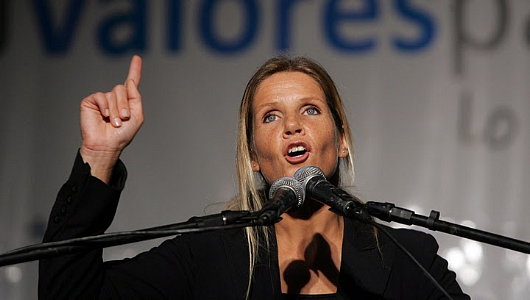
In the Sunday after-church tea-drinking circles of Manhattan, much thought and disputation was provoked by Damian Thompson’s recent revelation that the senator-elect from Florida, Mr. Marco Rubio, is in fact an evangelical Protestant despite his office claiming he is a Catholic. Word comes from Argentina about a member of parliament named Cynthia Hotton, a brazen defender of the right to life and solidarity with the unborn. (more…)
Dodgy ‘knighthood’ for a dodgy lady
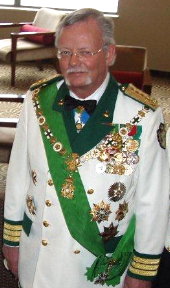
An example of the ‘Lazarus bling’, more medals than you can shake a stick at.
From the blog of John Smeaton we read that the former Irish president (and genial enemy of all that is good and holy) Mary Robinson has received a ‘knighthood’. Last month she was invested as a Dame in the self-styled ‘Order of St. Lazarus’, a fake order of knighthood. The group claims links to the old Order of St. Lazarus of which the last remnants faded away in the 1780s.
The current ‘Order’ was founded as a fake order of knighthood in 1910 by the confidence trickster Jean-Joseph Moser, and has grown by perhaps surprising leaps and bounds in the past few decades, taking into account P. T. Barnum’s famous maxim about a sucker being born every minute. The group has split into various factions and it has become notorious for having members in its ranks who don more metal “bling” than rap stars or Soviet generals.
The so-called Order of St. Lazarus exists throughout Europe and the Spanish- and English-speaking countries abroad, including the United States. The French branch of St. Lazarus was forced by the Grand Chancellor of the Legion of Honour to cease claiming to be an ‘order’, and members of the Order of Malta are forbidden from participating in St. Lazarus’s activities.
“The Order’s pretensions have been strongly condemned by the Holy See as aiming to replace ‘the legitimate forms of chivalric awards’,” according to Guy Stair Sainty, the acknowledged expert on these somewhat arcane affairs. Nonetheless, Guy points out that “supporters of Saint Lazarus include the heads of a handful of great noble families and, over the years, several leading Churchmen and Cardinals”.
“The Order of Saint Lazarus, although it is to be complimented for its considerable charitable efforts (notably in Germany), need not pretend to an historical continuity to which its claims, at the very least, are unsubstantiated,” Guy Stair Sainty concludes. “Were it to assume the character of a private association, founded in 1910, to emulate the traditions of the ancient crusader Order, it could deflect much of the hostility it has attracted… It would be much more successful and be more readily welcomed into the wider community of international humanitarian bodies, however, if it was to permit an honest appraisal of its origins.”
Zuma in Orania
President is Welcomed at Afrikaners-Only Enclave in Northern Cape

President Zuma yesterday paid a ‘goodwill visit’ to the whites-only Afrikaner enclave of Orania in the Northern Cape. The trip was prompted when Pres. Zuma received word that the town’s founded Prof. Carel Boshoff IV, was in poor health. Orania was founded in 1990, some months after whites voted to dismantle apartheid, as a place where Afrikaner self-reliance could be practiced and cultural heritage preserved. The town has pioneered various agricultural and ecological projects, and in 2004 started its own local currency, the Ora, which is equal to ten rand. (more…)
Douglas Murray: In Order to Prevent the Use of WMDs, We Must Use WMDs
The slightly camp Old Etonian atheist neo-con Douglas Murray got himself into a bit of trouble recently when he and Baroness Deech unleashed a splenetic rant against Scotland and the Scots on BBC Radio 4. As head of the HFEA, Baroness Deech presided over the deaths of an untold number of humans in the embryonic stage of development, but it turns out that Mr. Murray (who is Scottish-born, curiously) has advocated hypothetical wholesale slaughter.
In 2007, Mr. Murray helped compose Towards a Grand Strategy for an Uncertain World: Renewing Transatlantic Partnership ostensibly written by Gen. Dr. Klaus Naumann (former Bundeswehr Chief of Staff), Gen. Prince John Salikashvili (Georgian prince and former U.S. Chairman of the Joint Chiefs of Staff), Field Marshal the Lord Inge (former U.K. Chief of the General Staff), Adm. Jacques Lanxade (former Chief of the French Navy), and Gen. Henk van den Breemen (accomplished organist and former Chief of Staff of the Dutch military).
This interesting document made a number of recommendations, the most intriguing of which is the suggestion that NATO should be prepared to make a pre-emptive nuclear strike… in order to prevent the use of weapons of mass destruction (“WMDs”) such as, er, nuclear weapons. You read that correctly: in order to prevent the use of WMDs, NATO should be prepared to use WMDs. You couldn’t make it up!
Debating Hiroshima
Christian morality versus modern relativism
THREE YEARS AGO over on the New Criterion’s blog, Armavirumque, my friend and then-colleague & boss Roger Kimball and I had an interesting exchange on the morality of the bombing of Hiroshima. The debate began when Roger wrote a blog entry citing an opinion piece from Oliver Kamm of the Guardian supporting President Truman’s decision to drop the Bomb. I then responded with a post of my own pointing out that the conservative reaction at the time was one of horror at the moral depravity to which we had descended, and that the it-would-have-been-worse-if-we-didn’t school of thought essentially can be reduced to an ends-justifies-the-means argument. Roger then responded with a post arguing that, well, sometimes the ends do justify the means.
Regardless of one’s thoughts on the Hiroshima bombing, arguing that the ends justifies the means is one of the cornerstones of relativism. Christians believe that we are not allowed to do evil, even if that evil may serve a good cause. It is not simply a matter of choosing something bad over something worse. Evacuating the British Army from Dunkirk, for example, was bad, but leaving it there was worse. Yet, both were morally licit options for Churchill to make, though the prudential evidence supported the former option rather than the latter.
Innocent people inevitably die in most wars, but that cannot excuse the deliberate and intentional targeting of an entire city for destruction by a military force. That so many American Christians still excuse the bombing of Hiroshima and Nagasaki is frightening evidence that America has convinced Christians to be Americanised rather than Christianity convincing America to be Christianised. (more…)
Thomas Molnar, 1921–2010
The Catholic philosopher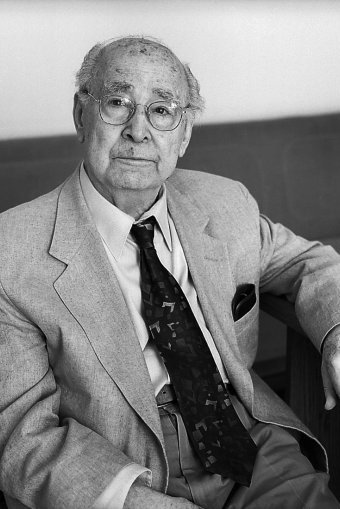 and historian Thomas Molnar died last week in Virginia at eighty-nine years of age, just six days short of reaching his ninetieth year. Born Molnár Tamás in Budapest in 1921, the only son of Sandor and Aranka, Molnar was schooled across the Romanian border in the town of Nagyvárad (Rom.: Oradea) in the Körösvidék, a region often included in Transylvania and an integral part of Hungary until the Treaty of Trianon cleaved it a year before. In 1940 he moved to Belgium to begin his higher education in French, and as a leader in the Catholic student movement he was interned by the German occupiers and sent to Dachau. With the end of hostilities, he returned to Brussels before arriving home in Budapest to witness the gradual Communist takeover of Hungary.
and historian Thomas Molnar died last week in Virginia at eighty-nine years of age, just six days short of reaching his ninetieth year. Born Molnár Tamás in Budapest in 1921, the only son of Sandor and Aranka, Molnar was schooled across the Romanian border in the town of Nagyvárad (Rom.: Oradea) in the Körösvidék, a region often included in Transylvania and an integral part of Hungary until the Treaty of Trianon cleaved it a year before. In 1940 he moved to Belgium to begin his higher education in French, and as a leader in the Catholic student movement he was interned by the German occupiers and sent to Dachau. With the end of hostilities, he returned to Brussels before arriving home in Budapest to witness the gradual Communist takeover of Hungary.
Molnar left for the United States, where he earned his Ph.D. from Columbia University in 1950. He frequently contributed to the pages of National Review after its foundation by William F. Buckley in 1955, and his periodic writings were often found in Monde et Vie, Commonweal, Modern Age, Triumph, and other journals. From 1957 to 1967 he taught French & World Literature at Brooklyn College before moving on to become Professor of European Intellectual History at Long Island University. In 1969 he was a visiting professor at Potchefstroom University in the Transvaal. In 1983 he was awarded an honorary doctorate by the University of Mendoza in Argentina while he was a guest professor at Yale. After the fall of the Communist regime in Hungary, he taught at the University of Budapest and at the Catholic University (PPKE). In 1995 he was elevated to the Hungarian Academy of Arts.
While his first book, Bernanos: his political thought and prophecy (1960), was well-received, it was Molnar’s second published work that was arguably his best known. The Decline of the Intellectual (1961) was, in Molnar’s own words, “greeted favorably by conservatives, with respectful puzzlement by the left, and was dismissed by the liberal progressives.” Gallimard began discussions to print a French translation as part of its prominent Idées series, before the publisher’s in-house Marxist Dionys Mascolo vetoed it for its treatment of Marxism as a utopian ideology. The celebrated & notorious Soviet spy Alger Hiss complimented it in a Village Voice review, but Molnar noted that The Decline of the Intellectual‘s harshest criticism came from liberal Catholic circles. “Obviously,” he wrote, “in that moment’s intellectual climate, they would have preferred a breathless outpouring of Teilhardian enthusiasm.”
The book argued, from a deeply conservative European mindset, that the rise of the intelligentsia during the nineteenth century was tied to its capacity as an agent of bourgeois social change. As the intellectual class increasingly shaped the more democratic, more egalitarian (indeed, more bourgeois) world around it, the intelligentsia’s vitality, so tied to its capability to enact social change (Molnar argued), became self-destructive. The “decline” set in as the intelligentsia searched for alternative methods of social redemption in increasingly extreme fashions (such as nationalism, socialism, communism, fascism, &c.) and led to the intellectuals allying themselves with ideology, which is the surest killer of genuine intellectual and philosophical speculation.
The same year Molnar’s The Future of Education was published with a foreword by Russell Kirk, whose study of American conservative thinkers, The Conservative Mind, was admired by Molnar. Among the many works that followed were Utopia, the perennial heresy (1967), The Counter-Revolution (1969), Nationalism in the Space Age (1971), L’éclipse du sacré : discours et réponses in 1986 with Alain Benoist, and the following year The Pagan Temptation refuting Benoist’s neo-paganism, The Church, Pilgrim of Centuries (1990), and in 1996 Archetypes of Thought and Return to Philosophy. From then until his death, the remainder of his new books have been published in his native Hungarian language.
Molnar and his work have become sadly neglected for the very reasons he detailed in his major work: the overwhelming triumph of ideology over the intellectual sphere. While Russell Kirk defined conservatism as the absence of ideology, modern conservatism in America has become almost completely enveloped by ideology, and the Molnar’s deep, traditional way of thinking — influenced to a certain extent by de Maistre and Maurras — is now met more by silence and ignorance than by direct condemnation.
The triumph of ideology (be it on the left or the right) was aided and abetted, Molnar argued, by a culture dominated by media and telecommunications. “Around 1960,” Professor Molnar wrote later in his life, “the power of the media was not yet what it is today.”
Hardly anybody suspected then that the media would soon become more than a new Ceasar, indeed a demiurge creating its own world, the events therein, the prefabricated comments, countercomments—and silence. … The more I saw of universities and campuses, publishers and journals, newspapers and television, the creation of public opinion, of policies and their outcome, the less I believed in the existence of the freedom of expression where this really mattered for the intellectual/professional establishment. For the time being, I saw more of it in Europe, anyway, than in America: over there, institutions still stood guard over certain freedoms and the conflict of ideas was genuine; over here the democratic consensus swept aside those who objected, and banalized their arguments. The difference became minimal in the course of decades.
Needless to say, the world of American conservatism has been silent in responding to the death of Professor Molnar.
Ideology’s enforced forgetfulness aside, Molnar’s native Hungary renewed its appreciation for him just before his death: last year the Sapientia theological college organised the first conference devoted to his works, which was well-attended and much commented-upon in the Hungarian press. Besides his serious corpus of works, Molnar is survived by his wife Ildiko, his son Eric, his stepson Dr. John Nestler, and his seven grandchildren.
Requiescat in pace.
Previously: Understanding the Revolution
Elsewhere: Professor Thomas Molnar, In Memoriam
Interesting Things Elsewhere
This determined Celt is gunning for Thabo
Kevin Bloom | The Daily Maverick
Ireland’s 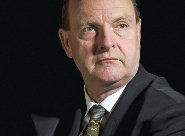 Paul O’Sullivan took over as head of security at South Africa’s airport authority in 2001, and discovered something was wrong from the start: why didn’t the policeman on duty want to take a statement about the attempted theft of his baggage? Since then, his life has been a series of bizarre events leading him ever deeper into the most complex criminal network of the post-apartheid era, including the recent the trial and conviction of former national police chief Jackie Selebi. But O’Sullivan’s determined quest to expose crookedness isn’t over yet, and he now has former president Thabo Mbeki in his sights. read more
Paul O’Sullivan took over as head of security at South Africa’s airport authority in 2001, and discovered something was wrong from the start: why didn’t the policeman on duty want to take a statement about the attempted theft of his baggage? Since then, his life has been a series of bizarre events leading him ever deeper into the most complex criminal network of the post-apartheid era, including the recent the trial and conviction of former national police chief Jackie Selebi. But O’Sullivan’s determined quest to expose crookedness isn’t over yet, and he now has former president Thabo Mbeki in his sights. read more
The apparatus of state will simply ignore the government
‘Inspector Gadget’ | Police Inspector Blog
Police across England were told by the responsible minister of the democratically elected government that they must not chase performance targets any longer. “I can also announce today that I am also scrapping the confidence target,” said the Home Secretary, Theresa May, “and the policing pledge with immediate effect”. But the ‘senior management team’ of the West Yorkshire Police have stated they will go on no matter what the government says. read more
Has Christian Democracy reached a dead end?
Jan-Werner Mueller | Guardian.co.uk
The commentator completes a brief survey of the struggles of Christian Democracy in Germany and Europe today. The French leader Georges Bidault claimed that Christian Democracy meant “to govern in the centre, and pursue, by the methods of the right, the policies of the left”. But Christian Democracy’s brief French moment in the 1950s didn’t survive the return of de Gaulle, and Christian Democratic parties on the continent today face an existential crisis. read more
Also: Monsignor Ignacio Barreiro’s talk at the Roman Forum’s 2010 Summer Symposium, entitled The Problem of Christian Democracy will be made available online in audio form sometime in the coming months.
Deep in Shanxi, the most Catholic village in China
Anthony E. Clark | Ignatius Insight
Church after church dot the landscape and high steeples rise above small villages as they do in southern France. Passing through a narrow side road one arrives and is welcomed by three great statues at the village entrance: St. Peter holding his keys is flanked by Saints Simon and Paul. Thirty minutes before Mass the village loudspeakers, once airing the revolutionary voice of Mao and Party slogans, now broadcasts the rosary. Welcome to Liuhecun, the most Catholic village in China. read more
Look for me in the Cotswolds.
Dino Marcantonio
The apologists for modernist architecture have tried for a century to gain public acceptance of and appreciation for their horrors. While the elites have almost overwhelmingly been converted, the general populace around the world still sees that the Emperor has no clothes, and almost always prefers architecture that reflects the tried and true, the local and the natural. Alain de Botton, the Swiss essayist, ‘pop philosopher’, and former ‘writer-in-residence’ at Heathrow Airport, is the latest to give it a go, this time in the pages of the modernist Architectural Record. Dino Marcantonio provides a most useful fisking. read more
Canada is a French country
Andrew Coyne | Maclean’s
At the recent Canada Day celebrations on Parliament Hill, Canadian PM Stephen Harper spoke of “the steadfast determination and continental ambition of our French pioneers, who were the first to call themselves ‘Canadians.’” At other times he has spoken of Canada as having been “born in French,” of French as “Canada’s first language,” and, most famously, of Quebec City as “Canada’s first city,” its founding in 1608 as marking “the founding of the Canadian state.” While the sentiment may seen anodyne, moreover, the implications are radical. read more
Pure Democracy
“My firm conviction is that we of the conservative camp must put ourselves entirely onto a democratic basis. After the collapse of the old conditions nothing else can provide us with a future and a justification except pure democracy. Even if democracy has a dark side it is preferable to the quasi-democratic aristocracy of the representative system.” — Philipp Anton von Segesser, 1866
The Franco-Yorkshireman Jerome di Costanzo has an interesting article at OurKingdom on “You the People” Conservatism, interesting for the most part in that it has introduced me to Philipp Anton von Segesser, whom I had never heard of. I question, however, whether Jerome is correct to imply that Herr von Segesser and Mr. Cameron are quite such birds of a feather. The brilliance of the Swiss model — which Jerome rightly extols — is its democratic localism. But the Prime Minister is now seeking to introduce legislation which would set minimum prices for alcohol to avoid the almighty glut of cheap drink which (along with 24-hour openings) has contributed to the transformation of many British town centres into no-go-zones of public inebriation.
Would not the Swiss solution, instead, have been to merely devolve power either to counties (which barely exist anymore, and whose borders are in a state of permanent revolution) or to local town councils, and to allow them to react to the situation on the ground in a manner they deem appropriate?
Also, as Paul Mallinder points out, the government is attempting to solve a problem with a law, when really the only solution is a virtue. Virtues, though, are society’s responsibility, not the government’s. If people continually look to the government to solve problems by passing legislation instead of transforming society themselves by inculcating and promoting virtue, they deserve the nightmarish state they will end up with.
Frederik van Zyl Slabbert, 1940–2010
FREDERIK VAN ZYL SLABBERT, former South African parliamentarian, politician, and briefly chancellor of Stellenbosch university, died last week in Cape Town. ‘Van’, as he was known, was convinced after a night of heavy drinking to stand as a parliamentary candidate for the Progressive Party in 1974 and won a surprise victory in the Rondebosch constituency against the United Party incumbent by 1,600 votes. Within three years he became head of the merged Progressive Federal Party, and became Leader of the Opposition in the House of Assembly in 1979.
Koos van der Merwe, currently Chief Whip of the Inkatha Freedom Party, served in parliament alongside the liberal van Zyl Slabbert while the former was still a member of the Conservative Party. “He was a parliamentarian par excellence,” van der Merwe said after Van’s death, “and I remember how once, in a mere three-minute speech, he practically annihilated P. W. Botha.”
Despite wide acclaim as one of the finest debaters in parliament, van Zyl Slabbert shocked the political establishment in 1986 by resigning because he was convinced that parliament had become irrelevant to the running of the country. His resignation nearly ruined the PFP and frayed van Zyl Slabbert’s relationship with his fellow MP, the late Dame Helen Suzman.
Just a year later he organised the first meetings between members of the banned African National Congress and a group of National Party politicians, Afrikaner academics, and businessmen. In later years he co-founded a black investment trust, was appointed chairman of the Johannesburg Stock Exchange, sat on the boards of a number of South African corporations, and worked for the Open Society Foundation. Van Zyl Slabbert was appointed Chancellor of the University of Stellenbosch — for whom he had played rugby as an undergraduate — in 2008 but resigned for health reasons a year later, and was succeeded by Johann Rupert.
Mr. van der Merwe continued:
What amazed me about Van Zyl Slabbert was the depth of his political knowledge and his wisdom. He knew and understood the policies of each political party better than they did themselves. On one occasion, at a seminar in Williamsburg in the U.S.A., I represented the Conservative Party and was confronted with questions I could not answer. I asked to be excused for a few minutes and went to van Van Zyl Slabbert and asked him how I, as a Conservative MP, should answer. He immediately gave me the right answers because he fully understood the views and beliefs of the Conservatives. And for that matter, each and every political party. He was in fact a mobile political library.
When the late Dr Treurnicht’s daughter approached Van Zyl Slabbert for assistance to move to the U.S.A. to marry a black man, Van Zyl Slabbert did not use that information against Treurnicht. At that stage, it was unthinkable for a white Conservative to marry a black man. News of Treurnicht’s daughter marrying a black man would have led to the end of Treurnicht’s political career. Van Zyl Slabbert confidentially told me the story but it never made the headlines. What an honourable man!
His part in the struggle for Afrikaans at Stellenbosch was indeed an eye opener. Where were the Verkramptes? The old Conservatives of which I was a member? Nowhere. The fight for Afrikaans was led by the “liberal jingoes” such as Van Zyl Slabbert, Hermann Giliomee, and Breyten Breytenbach. …
I also never once saw him angry.
Mooi loop, Van Zyl. Koos gaan jou mis.
Requiescat in pace.
The World Turned Upside Down

— philosopher George Santayana
I can’t remember who it was that, watching the fall of the Berlin Wall and the collapse of the Iron Curtain, said never in his right mind did he expect that within just a decade Washington would be the chief propagator of worldwide revolution and the Kremlin would be a relatively conservative power, guarding jealously its local sphere of influence. What could add more of a dash of the absurd (and yet, eminently sensible) than the Russian government, facing the worst crisis of population decline of any major power, promoting larger families with a poster campaign quoting the conservative American philosopher George Santayana.
The Freiherr of Finance
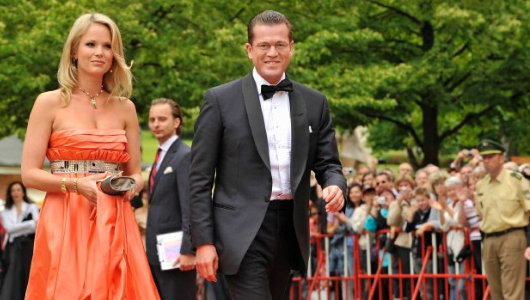
Germany’s new finance minister, Freiherr zu Guttenberg & his wife, Freifrau Stephanie.
Unmentioned by this editorial is that Baron zu Guttenberg’s grandfather (his mother’s father) was the late German winemaker & Croatian politician the Count of Vukovar. From the Count, Baron zu Guttenberg is descended from the noble house of Eltz, who are responsible for one of my favourite castles in the whole world, Burg Eltz, which once graced the 500-deutschmark note.
At the ripe age of 70, the Count of Vukovar took up arms in defence of the town of Vukovar during the Yugoslav Wars of 1991. The Count was elected to the Croatian parliament the following year as an independent, and served in that body until 1999, when he retired from politics. Nonetheless, the Croatian parliament persuaded him to accept honourary membership of parliament in his own right, in which role he continued until his death in 2006.
The Baron’s wife, meanwhile, is Stephanie, Countess of Bismarck-Schönhausen, great-great-granddaughter of the “Iron Chancellor”, Otto von Bismarck. A portent of this economics minister’s future?
David Kerr for Glasgow North East
 While the baggage-handler and much-celebrated hero of the Glasgow Airport attacks, Mr. John Smeaton QGM (“This is Glasgow; we’ll set aboot ye. … You’re no’ hitting the Polis mate, there’s nae chance.”) has announced he is going to contest the Glasgow North East by-election for some fringe electoral outfit, this blog is happy to report that there is already a perfectly laudable candidate who is seeking the privilege of serving the constituents of that district at Westminster.
While the baggage-handler and much-celebrated hero of the Glasgow Airport attacks, Mr. John Smeaton QGM (“This is Glasgow; we’ll set aboot ye. … You’re no’ hitting the Polis mate, there’s nae chance.”) has announced he is going to contest the Glasgow North East by-election for some fringe electoral outfit, this blog is happy to report that there is already a perfectly laudable candidate who is seeking the privilege of serving the constituents of that district at Westminster.
Mr. David Kerr, a Catholic graduate of the University of St Andrews and until recently a senior editor of BBC Scotland’s “Reporting Scotland” programme, is the Scottish Nationalist candidate for Glasgow North East. The Labourite newspapers have already set David Kerr as the target of their sleaze machine, first for a derogatory comment about Glasgow Caledonian University “not having a reputation to tarnish” made in a jocular spirit of inter-academic rivalry, then over a television investigation into the availability of weaponry in which Mr. Kerr was pictured with… well, weapons! (Oh, the horror! Vote Labour!)
Mr. Kerr is believed to be a favourite of SNP leader Alex Salmond, the First Minister of Scotland. The SNP are currently the only major party in mainland Britain who are actively pursuing the Catholic vote. While SNP members tend to be vaguely left-wing and pro-independence (as is the official party policy), SNP voters are often more traditional or conservative and in favour of preserving some form of union. (The Conservative Party, meanwhile, is frequently perceived as a party for liberal English toffs; a perception reinforced by David Cameron’s leadership). The Nationalists are doubtless trying to repeat their victory over Labour in last year’s Glasgow East by-election, in which ethical issues are believed to have played a significant role in Labour’s defeat.
The bookmakers Ladbrokes are currently giving David odds of 5/4 in winning the seat, against 4/6 for Labour’s Willie Bain.
Search
Instagram: @andcusack
Click here for my Instagram photos.Most Recent Posts
- Burns Tower April 19, 2024
- Patrick in Parliament March 18, 2024
- Articles of Note: 13 March 2024 March 13, 2024
- Cambridge March 9, 2024
- Taken on Trust March 4, 2024
Most Recent Comments
Book Wishlist
Monthly Archives
Categories


